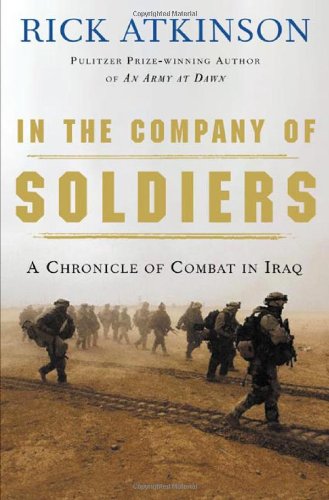Showing In the Company of Soldiers by Rick Atkinson
No recommendations yet View on Amazon (paid link)
In the Company of Soldiers is a thoroughly engrossing look at the strategies, personalities, and struggles of waging modern warfare. The advent of embedded reporters in the opening days of the 2003 US war on Iraq meant a more direct and personal point of view than battlefield coverage has historically offered. Rick Atkinson, winner of the Pulitzer Prize for An Army at Dawn, an account of combat in North Africa during World War II, traveled with the 101 Airborne Division of the US Army from its deployment out of Fort Campbell, Kentucky through its entry into Baghdad.
Much of Atkinson's focus falls on the division's leader, the hugely competitive and charismatic Major General David Petraeus, who seems to guide his troops through Iraq by sheer force of will. Atkinson devotes most of his time to the senior commanders, but the loss of the GI perspective, while disappointing, is outweighed by Atkinson's access to the minds of the brass who must navigate an Iraq whose citizens were not nearly as happy as military planners had hoped and who offered resistance in ways other than what the Americans had prepared for.
While plenty has been written about the American military effort in Iraq, Atkinson's perspective, combined with a direct, economical writing style, allows him to present sides to the war not often seen or considered: long periods of waiting punctuated with mad scrambles to apply gas masks, fretting over how to pack all necessary supplies into tiny kits, dealing with dust storms that can ground state of the art attack helicopters, and reading the irreverent yet shrewdly observant graffiti left by American soldiers. In the Company of Soldiers lionises the American military officers but it neither condemns nor offers unqualified praise to the US effort in Iraq. Indeed, the disturbing omens of chaos hinted at soon after the invasion began in the spring of 2003 would come into sharper relief when the book was published a year later. --John Moe, Amazon.com